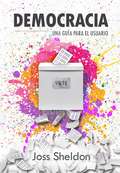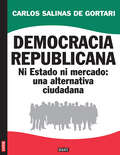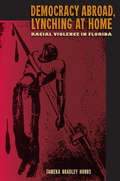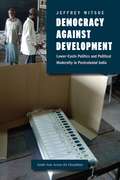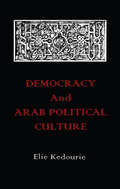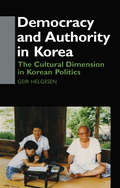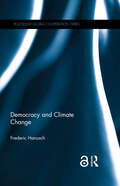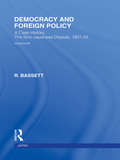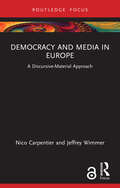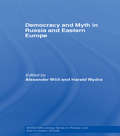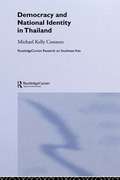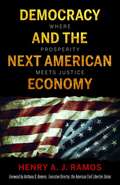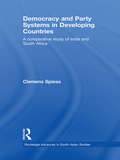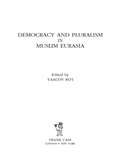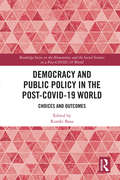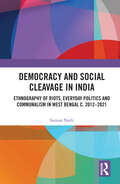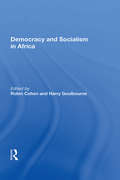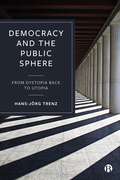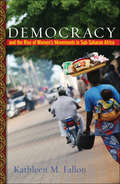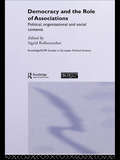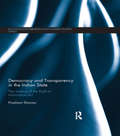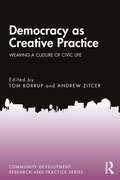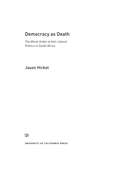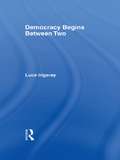- Table View
- List View
Democracia: Una Guía Para el Usuario
by Joss SheldonDICEN QUE VIVIMOS EN UNA DEMOCRACIA. QUE SOMOS LIBRES Y DEBERÍAMOS ESTAR AGRADECIDOS. ¿Pero cuán "libres" somos? ¿Cuán democráticas son realmente nuestras denominadas "Democracias"? ¿Es suficiente con elegir a nuestros líderes y luego sentarnos, indefensos, mientras nos gobiernan como dictadores? ¿De qué sirve elegir a nuestros políticos, si no podemos controlar nuestros medios de comunicación, la policía o la milicia? Si debemos seguir ciegamente las órdenes de nuestros maestros y jefes, en la escuela y en el trabajo, ¿no es un poco ingenuo creer que somos los dueños de nuestros propios destinos? Y si nuestros recursos son controlados por una pequeña cábala de plutócratas, banqueros y corporaciones; ¿podemos decir honestamente que nuestras economías están siendo dirigidas por nosotros? ¿No podrían las cosas ser un poco más, bueno, democráticas? ¡Por supuesto que sí! "Democracia: Una guía para el usuario" nos muestra cómo... Dentro de las páginas de este libro lleno de historias, visitaremos Summerhill, una escuela democrática situada en el este de Inglaterra, antes de hacer una parada en Brasil para echar una ojeada a Semco, donde la democracia en el lugar de trabajo es el nombre del juego. Viajaremos a Rojava, para explorar como es la vida en un ejército democrático, y luego nos dirigiremos a España, para ver por qué Podemos está dando una oportunidad a la democracia líquida. Viajaremos atrás en el tiempo, para estudiar la democracia en el la vida diaria de las sociedades de cazadores-recolectores, las confederaciones tribales, los gremios y las comunas. Consideraremos el caso del presupuesto participativo, la democracia deliberativa, la contratación colaborativa, las monedas comunitarias, los préstamos entre pares y mucho más. El mensaje es claro y conciso: La democracia no tiene que ser una quimera. Tenemos todas las herramientas que necesitamos para gobernarnos a no
Democracia republicana
by Carlos Salinas de GortariDemocracia republicana expone las ideas del ex presidente Carlos Salinas de Gortari acerca del riesgo que enfrentan los ciudadanos y la república. La República está en riesgo. De ese tamaño es el trance por el que atraviesa México. En el bicentenario de la Independencia y el centenario de la Revolución, la nación vuelve a enfrentar retos formidables que provienen tanto del interior de su territorio como más allá de sus fronteras. En el ámbito interno, se vive cotidianamente la angustia de la inseguridad. A esto se suma la década perdida de oportunidades económicas y de esperanzas sociales frustradas. El riesgo para México se agrava por el debate de las ideas en los medios: el país parece estar empobrecido intelectualmente. Frente a la dependencia pendular entre más mercado o más Estado, neoliberalismo o neopopulismo, esta obra es una propuesta para que los ciudadanos construyan una alternativa progresista. Se trata de pasar de los individuos que sólo votan y consumen a los grupos de ciudadanos que participan, se organizan y transforman su realidad. Para enfrentar la adversa realidad se requiere construir una nueva etapa del liberalismo social: la democracia republicana. Se propone una democracia con adjetivos porque ahora es el momento de los ciudadanos participativos, mediante organizaciones y un compromiso colectivo. El texto invita en particular a las mujeres y a los jóvenes a participar de manera comprometida. Hoy que México está en riesgo, la vinculación de la democracia con su adjetivo republicano resulta indispensable. Existe la posibilidad de construir una alternativa viable para la soberanía y la justicia. Pero nadie hará por los mexicanos lo que ellos no hagan por sí mismos de manera organizada y participativa. Por eso esta obra procura contribuir a la construcción de la democracia republicana, una alternativa por y para los ciudadanos.
Democracy Abroad, Lynching at Home: Racial Violence in Florida
by Tameka Bradley Hobbs"Hobbs unearths four lynchings that are critical to the understanding of the origins of civil rights in Florida. The oral histories from the victims' families and those in the communities make this a valuable contribution to African American, Florida, and civil rights history."--Derrick E. White, author of The Challenge of Blackness "A compelling reminder of just how troubling and violent the Sunshine State's racial past has been. A must read."--Irvin D.S. Winsboro, editor of Old South, New South, or Down South? Florida is frequently viewed as an atypical southern state--more progressive and culturally diverse--but, when examined in proportion to the number of African American residents, it suffered more lynchings than any of its Deep South neighbors during the Jim Crow era. Investigating this dark period of the state's history and focusing on a rash of anti-black violence that took place during the 1940s, Tameka Hobbs explores the reasons why lynchings continued in Florida when they were starting to wane elsewhere. She contextualizes the murders within the era of World War II, contrasting the desire of the United States to broadcast the benefits of its democracy abroad while at home it struggled to provide legal protection to its African American citizens. As involvement in the global war deepened and rhetoric against Axis powers heightened, the nation's leaders became increasingly aware of the blemish left by extralegal violence on America's reputation. Ultimately, Hobbs argues, the international implications of these four murders, along with other antiblack violence around the nation, increased pressure not only on public officials in Florida to protect the civil rights of African Americans in the state but also on the federal government to become more active in prosecuting racial violence. Tameka Bradley Hobbs is assistant professor of history at Florida Memorial University.
Democracy against Development: Lower-Caste Politics and Political Modernity in Postcolonial India
by Jeffrey WitsoeHidden behind the much-touted success story of India s emergence as an economic superpower is another, far more complex narrative of the nation s recent history, one in which economic development is frequently countered by profoundly unsettling, and often violent, political movements. In"Democracy against Development," Jeffrey Witsoe investigates this counter-narrative, uncovering an antagonistic relationship between recent democratic mobilization and development-oriented governance in India. Witsoe looks at the history of colonialism in India and its role in both shaping modern caste identities and linking locally powerful caste groups to state institutions, which has effectively created a postcolonial patronage state. He then looks at the rise of lower-caste politics in one of India s poorest and most populous states, Bihar, showing how this increase in democratic participation has radically threatened the patronage state by systematically weakening its institutions and disrupting its development projects. By depicting democracy and development as they truly are in India in tension Witsoe reveals crucial new empirical and theoretical insights about the long-term trajectory of democratization in the larger postcolonial world. "
Democracy and Arab Political Culture
by Elie KedourieExcept for Israel, the Middle East remains largely untouched by the democratic revolution that swept across Eastern Europe and the former USSR. This book aims to explain and analyze the reasons why despotism or religious fundamentalism continue to control the Middle Eastern countries.
Democracy and Authority in Korea: The Cultural Dimension in Korean Politics
by Geir HelgesenThis controversial new study, breaks with the tradition of basing political studies on analyses of institutions and political personalities, by likening the Republic of Korea to a laboratory for the clash of political cultures. In the late 1940s, the Americans embarked upon a democratization programme designed to create a Western bulwark against the spread of communism in East Asia. The intervening years have seen the advent and demise of military rule, with South Korea now having a democratically-elected government. Although the US strategy thus seems successful, the political crises of 1995 in fact indicate that many obstacles remain here to the adoption of Western-style democracy.This study argues that socialization in general and political socialization in particular are key factors in any analysis of democracy, be it in Korea or elsewhere. Accordingly, the work draws on moral education textbooks, together with surveys and interviews among members of the urban intellectual elite. In this manner, the psychological roots of power and authority - key concepts to an understanding of 'good government' - are explored.
Democracy and Climate Change (Routledge Global Cooperation Series)
by Frederic HanuschDemocracy and Climate Change explores the various ways in which democratic principles can lead governments to respond differently to climate change. The election cycle can lead to short-termism, which often appears to be at odds with the long-term nature of climate change, with its latency between cause and effect. However, it is clear that some democracies deal with climate change better than others, and this book demonstrates that overall stronger democratic qualities tend to correlate with improved climate performance. Beginning by outlining a general concept of democratic efficacy, the book provides an empirical analysis of the influence of the quality of democracy on climate change performance across dozens of countries. The specific case study of Canada’s Kyoto Protocol process is then used to explain the mechanisms of democratic influence in depth. The wide-ranging research presented in the book opens up several new and exciting avenues of enquiry and will be of considerable interest to researchers with an interest in comparative politics, democracy studies and environmental policies.
Democracy and Climate Change (ISSN)
by Frederic HanuschDemocracy and Climate Change explores the various ways in which democratic principles can lead governments to respond differently to climate change. The election cycle can lead to short-termism, which often appears to be at odds with the long-term nature of climate change, with its latency between cause and effect. However, it is clear that some democracies deal with climate change better than others, and this book demonstrates that overall stronger democratic qualities tend to correlate with improved climate performance.Beginning by outlining a general concept of democratic efficacy, the book provides an empirical analysis of the influence of the quality of democracy on climate change performance across dozens of countries. The specific case study of Canada’s Kyoto Protocol process is then used to explain the mechanisms of democratic influence in depth. The wide-ranging research presented in the book opens up several new and exciting avenues of enquiry and will be of considerable interest to researchers with an interest in comparative politics, democracy studies and environmental policies.The Open Access version of this book, available at http://www.taylorfrancis.com, has been made available under a Creative Commons Attribution-Non Commercial-No Derivatives (CC-BY-ND) 4.0 license.
Democracy and Foreign Policy (Routledge Library Editions: Japan)
by R BassettThe Sino-Japanese crisis of 1931-33 provides effective illustrations of wider themes in British Foreign Policy. It might even be said that the general pattern of opinion in the UK at the time was to be reproduced in subsequent crises. The Manchurian problem and the controversies which it provoked give invaluable clues to an understanding of later developments.
Democracy and Media in Europe: A Discursive-Material Approach
by Nico Carpentier Jeffrey WimmerDemocracy and Media in Europe: A Discursive-Material Approach is a theoretical reflection on the intersection of democracy and media through a constructionist lens.This focus allows us to understand current political struggles over democracy, and over media’s democratic roles, with the latter ranging from the traditional support for an informed citizenry and the watchdog role, to the organization of agonistic debate and generating fair and dignified representations of society and its many (sub)groups, to the facilitation of maximalist participation in institutionalized politics and media. Moreover, the book’s reconciliation of democratic theory and media theory brings out a detailed theoretical analysis of the core characteristics of the assemblages of democracy and media, their conditions of possibility and the threats to both democracy and media’s democratic roles.This short book provides in-depth reflections on the different positions that can be taken when it comes to the performance of democracy as it intersects with the multitude of media in the 21st century. As such, the volume will be of interest to scholars of media and communication and related fields in the social sciences.The Open Access version of this book, available at http://www.taylorfrancis.com, has been made available under a Creative Commons Attribution-Non Commercial-No Derivatives (CC-BY-NC-ND) 4.0 license.
Democracy and Myth in Russia and Eastern Europe (BASEES/Routledge Series on Russian and East European Studies #Vol. 36)
by Harald Wydra Alexander WöllIn the absence of democratic state institutions, eastern European countries were considered to possess only myths of democracy. Working on the premise that democracy is not only an institutional arrangement but also a civilisational project, this book argues that mythical narratives help understanding the emergence of democracy without ‘democrats’. Examining different national traditions as well as pre-communist and communist narratives, myths are seen as politically fabricated ‘programmes of truth’ that form and sustain the political imagination. Appearing as cultural, literary, or historical resources, myths amount to ideology in narrative form, which actors use in political struggles for the sake of achieving social compliance and loyalty with the authority of new political forms. Drawing on a wide range of case studies including Ukraine, Russia, Poland, Hungary, and Czechoslovakia, this book argues that narratives about the past are not simply ‘legacies’ of former regimes but have actively shaped representations and meanings of democracy in the region. Taking different theoretical and methodological approaches, the power of myth is explored for issues such as leadership, collective identity-formation, literary representation of heroic figures, cultural symbolism in performative art as well as on the constitution of legitimacy and civic identity in post-communist democracies.
Democracy and National Identity in Thailand (Rethinking Southeast Asia #Vol. 7)
by Michael Kelly ConnorsThis book seeks to illuminate how Thai elites have used democracy as an instrument for order and discipline. Drawing on interviews, numerous Thai language sources, and critical theory, the author reveals a remarkable adaptation of the idea of democracy in the Thai context. Connors shows how elites have drawn on Western political theory to design projects to create modern citizens. He argues that it is possible to see the idea and practice of elite liberal democracy in Thailand, and elsewhere, as a key ideological resource in the project of securing hegemony over undisciplined populations. In this perspective the ideas of civil society, civic virtue, social capital and democracy itself are all part of the weaponry deployed in an effort to create 'good citizens', who act as guardians of the elite defined common good.
Democracy And The Next American Economy: Where Prosperity Meets Justice
by Henry A. J. RamosProgressive intellectual Henry A. J. Ramos believes the United States is at a crossroads, facing the most challenging moment since the civil rights movement of the late 1960s and early 1970s. In fact, absent major new interventions and investments, he sees this moment as a pivotal turning point in the American journey in which political polarization, income and wealth disparity and public violence"€"much of which is race related"€"threaten the very essence and integrity of our democracy and economy. Ramos examines the policies that have contributed to America's decline, including those that have led to the concentration of great wealth in the hands of a few while condemning many to systemic poverty and inequality. Current economic and social trends, he stresses, are unsustainable and call for organized, concerted action by people of conscience and those affected. <P><P> Ultimately, Ramos provides a roadmap for the future so the United States can continue to provide opportunities for its people and serve again as a leader in the international community. He offers case studies of organizations that have successfully created and administered programs that further equity in society, restore democratic practices, implement better urban and city planning and protect the environment. <P><P> Demonstrating both the critical importance and real possibility of leveraging prosperity and justice for all Americans, this compelling work is a must-read for anyone interested in democracy, economic restoration and environmental sustainability.
Democracy and Party Systems in Developing Countries: A comparative study of India and South Africa (Routledge Advances in South Asian Studies #Vol. 12)
by Clemens SpiessThis book examines and compares the emergence, development and impact of the party systems in post-colonial India and post-apartheid South Africa. It sheds light on the crucial role and function of party systems in democratising developing countries. Although often described as political miracles or empirical anomalies, both countries actually figure prominently in party system and democratic theory due to their regional importance and the important role the party system plays in their political trajectory. The author employs a diachronic comparison of the two party systems, with a distinct focus on the role of party agency in the shaping and maintenance of one-party-dominance and on the role of the two party systems as independent variables. Highlighting the similarities and differences between the two systems, he examines whether the lessons learned from the Indian experience in terms of the function and effects of the country’s post-independent party system and the role of party agency therein are applicable to South Africa. This book will be of interest to academics working in the field of democracy, comparative politics and development in general, and South Africa and South Asia in particular.
Democracy and Pluralism in Muslim Eurasia (Cummings Center Series)
by Yaacov Ro’iThis book is devoted to the study and analysis of the prospects for democracy among the Muslim ethnicities of the Commonwealth of Independent States (CIS), both those that have acquired full independence and those remaining within the Russian Federation. The nineteen Western academics and scholars from the Muslim countries and regions of the CIS who contribute to this volume view the establishment of democratic institutions in this region in the context of a wide and complex range of influences, above all the Russian/Soviet political legacy; native ethnic political culture and tradition; the Islamic faith; and the growing polarity between Western civilization and the Muslim world.
Democracy and Public Policy in the Post-COVID-19 World: Choices and Outcomes (Routledge Series on the Humanities and the Social Sciences in a Post-COVID-19 World)
by Rumki BasuAfter the COVID-19 disaster, ‘old’ frailties and inadequacies in agriculture and industrial productive capacities, in public health and transport systems have evinced sharply in the open, reopening the debates over public policy reforms as never before. This volume: Studies the likely impact of the COVID-19 pandemic on future policy making in India and other democracies. Critically looks at the available theoretical frameworks, models and approaches used in the policy making process and studies their contemporary relevance. Balances theoretical approaches with concrete case studies. Examines India’s policies on education, health, e-governance, gender and work, and also provides recommendations for the future. An important and timely contribution, this book will be of great interest to scholars and researches of public administration, public policy, political theory, globalization and global democracy.
Democracy and Social Cleavage in India: Ethnography of Riots, Everyday Politics and Communalism in West Bengal c. 2012–2021
by Suman NathThis book explores the emergence of identity politics and violence at the forefront of political life in an Indian state. Through a close reading of everyday politics in West Bengal, India, which until recently boasted of the longest-serving elected communist government in the world, the volume presents unique observations on Indian politics and its trajectories. One of the first ethnographic studies of religious polarisation and its interface with politics in West Bengal, this book: Offers a fresh perspective, both theoretically and empirically, by using longitudinal, multi-site ethnography, to explain the mechanisms by which identity issues have re-emerged; Studies key policy changes, political practices, and series of invented traditions during periods of political transition; Examines intricate details of the micro-dynamics of the formulation and expansion of Hindu and Islamic fundamentalism and their political counterparts, which carry a capacity to push away secular, democratic forces from the existing political spectrum; Sheds light on the mechanisms of riots, its design, organisational bases, and mechanisms of spread; Includes key observations from the 2021 elections in the state. The volume will be of great interest to scholars and researchers of political science, social and cultural anthropology, sociology, and South Asian studies.
Democracy And Socialism In Africa
by Robin CohenAfter independence many African countries abjured conventional patterns of political representation and democratic participation in the interest of creating a unified state and promoting economic development. Today, however, the dominant models of one-party democracy and African socialism are in terminal collapse as a result of internal pressures a
Democracy and the Public Sphere: From Dystopia Back to Utopia
by Hans-Jörg TrenzFrom fake news to infringement of privacy in digital spheres, the changing landscapes of media and public communication have completely transformed contemporary democracies in recent decades. Disruptions of media functioning can be seen as evidence for a transition from democracy to post-democracy, but how plausible is this scenario? Using empirical evidence, the author asks how imminent the threat of the end of democracy is, and how it can be restored. Exploring the creative and destructive ways individuals and groups make use of new digital and social media in democratic societies across the world, the book presents a much-needed critical theory of the public sphere as we enter the new digital age.
Democracy and the Rise of Women's Movements in Sub-Saharan Africa
by Kathleen M. FallonDespite a late and fitful start, democracy in Africa, Latin America, and Eastern Europe has recently shown promising growth. Kathleen M. Fallon discusses the role of women and women's advocacy groups in furthering the democratic transformation of formerly autocratic states.Using Ghana as a case study, Fallon examines the specific processes women are using to bring about political change. She assesses information gathered from interviews and surveys conducted in Ghana and assays the existing literature to provide a focused look at how women have become involved in the democratization of sub-Saharan nations. The narrative traces the history of democratic institutions in the region—from the imposition of male-dominated mechanisms by western states to latter-day reforms that reflect the active resurgence of women’s political power within many African cultures—to show how women have made significant recent political gains in Ghana and other emerging democracies. Fallon attributes these advances to a combination of forces, including the decline of the authoritarian state and its attendant state-run women's organizations, newly formed constitutions, and newfound access to good-governance funding. She draws the study into the larger debate over gendered networks and democratic reform by exploring how gender roles affect and are affected by the state in Africa, Latin America, and Eastern Europe. In demonstrating how women’s activism is evolving with and shaping democratization across the region, Democracy and the Rise of Women’s Movements in Sub-Saharan Africa reveals how women’s social movements are challenging the barriers created by colonization and dictatorships in Africa and beyond.
Democracy and the Role of Associations: Political, Strutural and Social Contexts (Routledge/ECPR Studies in European Political Science)
by Sigrid RoβteutscherVoluntary associations have been presented as a solution to political apathy and cynicism towards representative democracy. The authors collected in this volume, however, argue that these claims require more robust substantiation and seek to critically examine the crucial link between the associative sector and the health of democracy. Focusing on the role of context and using diverse approaches and empirical material, they explore whether these associations in differing socio-political contexts actually undermine rather than reinvigorate democracy.
Democracy and Transparency in the Indian State: The Making of the Right to Information Act (Routledge/Edinburgh South Asian Studies Series)
by Prashant SharmaThe enactment of the national Right to Information (RTI) Act in 2005 has been produced, consumed, and celebrated as an important event of democratic deepening in India both in terms of the process that led to its enactment (arising from a grassroots movement) and its outcome (fundamentally altering the citizen--state relationship). This book proposes that the explanatory factors underlying this event may be more complex than imagined thus far. The book discusses how the leadership of the grassroots movement was embedded within the ruling elite and possessed the necessary resources as well as unparalleled access to spaces of power for the movement to be successful. It shows how the democratisation of the higher bureaucracy along with the launch of the economic liberalisation project meant that the urban, educated, high-caste, upper-middle class elite that provided critical support to the demand for an RTI Act was no longer vested in the state and had moved to the private sector. Mirroring this shift, the framing of the RTI Act during the 1990s saw its ambit reduced to the government, even as there was a concomitant push to privatise public goods and services. It goes on to investigate the Indian RTI Act within the global explosion of freedom of information laws over the last two decades, and shows how international pressures had a direct and causal impact both on its content and the timing of its enactment. Taking the production of the RTI Act as a lens, the book argues that while there is much to celebrate in the consolidation of procedural democracy in India over the last six decades, existing social and political structures may limit the extent and forms of democratic deepening occurring in the near future. It will be of interest to those working in the fields of South Asian Law, Asian Politics, and Civil Society.
Democracy as Creative Practice: Weaving a Culture of Civic Life (ISSN)
by Tom Borrup Andrew ZitcerDemocracy as Creative Practice: Weaving a Culture of Civic Life offers arts-based solutions to the threats to democracies around the world, practices that can foster more just and equitable societies. Chapter authors are artists, activists, curators, and teachers applying creative and cultural practices in deliberate efforts to build democratic ways of working and interacting in their communities in a range of countries including the United States, Australia, Portugal, Nepal, the United Kingdom, and Canada. The book demonstrates how creativity is integrated in place-based actions, aesthetic strategies, learning environments, and civic processes. As long-time champions and observers of community-based creative and cultural practices, editors Tom Borrup and Andrew Zitcer elucidate work that not only responds to sociopolitical conditions but advances practice. They call on artists, funders, cultural organizations, community groups, educational institutions, government, and others to engage in and support this work that fosters a culture of democracy.This book is intended for undergraduate and graduate students in the humanities and social sciences, activists, funders, and artists who seek to understand and effect change on local and global scales to preserve, extend, and improve practices of democracy.
Democracy as Death
by Jason HickelThe revolution that brought the African National Congress (ANC) to power in South Africa was fractured by internal conflict. Migrant workers from rural Zululand rejected many of the egalitarian values and policies fundamental to the ANC's liberal democratic platform and organized themselves in an attempt to sabotage the movement. This anti-democracy stance, which persists today as a direct critique of "freedom" in neoliberal South Africa, hinges on an idealized vision of the rural home and a hierarchical social order crafted in part by the technologies of colonial governance over the past century. In analyzing this conflict, Jason Hickel contributes to broad theoretical debates about liberalism and democratization in the postcolonial world. Democracy as Death interrogates the Western ideals of individual freedom and agency from the perspective of those who oppose such ideals, and questions the assumptions underpinning theories of anti-liberal movements. The book argues that both democracy and the political science that attempts to explain resistance to it presuppose a model of personhood native to Western capitalism, which may not operate cross-culturally.
Democracy Begins Between Two (Athlone Contemporary European Thinkers Ser.)
by Luce IrigarayIn Democracy Begins Between Two, Luce Irigaray calls for a form of specific civil rights guaranteeing women a separate civil identity of their own equivalent to-though not simply the same as-that enjoyed by men.
